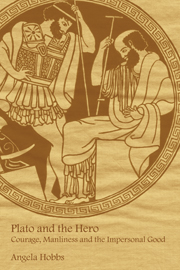Book contents
- Frontmatter
- Contents
- Acknowledgements
- Preface
- Glossary
- 1 The puzzle of Plato's thumos
- 2 Thumos, andreia and the ethics of flourishing
- 3 Arms and the man: andreia in the Laches
- 4 Odd virtue out: courage and goodness in the Protagoras
- 5 Why should I be good? Callicles, Thrasymachus and the egoist challenge
- 6 Heroes and role models: the Apology, Hippias Major and Hippias Minor
- 7 The threat of Achilles
- 8 Plato's response: the valuable as one
- 9 Alcibiades' revenge: thumos in the Symposium
- Epilogue: The weaver's art: andreia in the Politicus and Laws
- Bibliography
- Index
7 - The threat of Achilles
Published online by Cambridge University Press: 01 October 2009
- Frontmatter
- Contents
- Acknowledgements
- Preface
- Glossary
- 1 The puzzle of Plato's thumos
- 2 Thumos, andreia and the ethics of flourishing
- 3 Arms and the man: andreia in the Laches
- 4 Odd virtue out: courage and goodness in the Protagoras
- 5 Why should I be good? Callicles, Thrasymachus and the egoist challenge
- 6 Heroes and role models: the Apology, Hippias Major and Hippias Minor
- 7 The threat of Achilles
- 8 Plato's response: the valuable as one
- 9 Alcibiades' revenge: thumos in the Symposium
- Epilogue: The weaver's art: andreia in the Politicus and Laws
- Bibliography
- Index
Summary
THUMOS AMOK
The importance of Achilles in Republic 2 and 3 has gone strangely unremarked. He makes his first appearance at 379d, very near the beginning of the debate on the young Guardians' primary education. Socrates, disapprovingly, quotes Achilles' lines to Priam on Zeus' distribution of good and bad fates: in Socrates' view, God is responsible only for good; Achilles has got God wrong. From here until 391e, a mere twelve Stephanus chapters, there are fifteen more references to Achilles or his speeches, and two references to Patroclus. Furthermore, fourteen of the sixteen references involving Achilles are sharply critical, and the remaining two voice laments by Thetis on the tragic destiny of her son. Far from being worthy of comparison with Socrates, Achilles is presented in the Republic as a highly undesirable role model in every way. What has caused this startling fall from grace?
My proposal is simple. I suggest that by the time of the Republic and its more sophisticated moral psychology, Plato has come to see Achilles as the archetypal examplar of the thumos gone awry: a terrible warning of what can happen to a man when he is not only characterized by his thumoeidic elements – which must of course be the case with all the Auxiliary class – but is actually dominated by them, instead of being ruled by his or someone else's reason.
- Type
- Chapter
- Information
- Plato and the HeroCourage, Manliness and the Impersonal Good, pp. 199 - 219Publisher: Cambridge University PressPrint publication year: 2000

